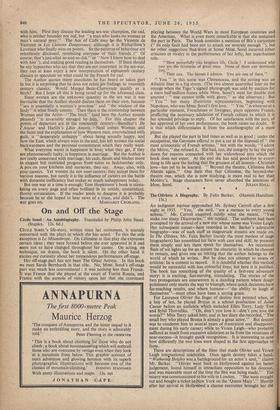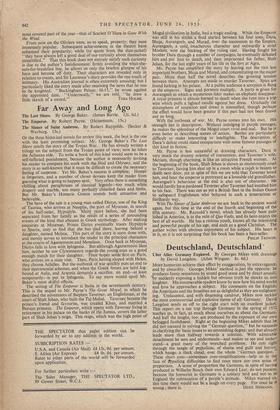AN indignant ingenue approached Mr. Sydney Carroll after a first
night in 1935. "You," she said, "are a menace to every young actress." Mr. Carroll enquired mildly what she meant. "You make too many Discoveries," she replied. The outburst had been prompted by the arrival of a new star whose name was Vivien Leigh. Her subsequent career—here recorded in Mr. Barker's admirable biography—was of such stuff as stagestruck dreams are made on. In The Oliviers, Mr. Felix Barker (surely the most modest of stage biographers) has assembled his facts with care and skill; he presents them simply and lets them speak for themselves. An occasional flash of wit lights up for an instant the obscurity in which he chooses to remain, and gives one an inkling that the author belongs to the world of which he writes. But he does not attempt to assess or criticise: he is content to record. It is doubtful whether this method would be successful with less colourful lives; but here it is justified. The book has something of the quality of a first-rate adventure story: it is exciting, fast-moving, stimulating. The stories of the two protagonists are interwoven in a dazzling pattern where disap- pointment only marks the way to triumph, where quick decisions have far-reaching results, and where humour—"the ability to laugh at themselves"—must often have been a saving grace.
For Laurence Olivier the finger of destiny first pointed when, as a boy of ten, he played Brutus in a school production of Julius Caesar before an audience which included Ellen Terry, Lady Tree and Sybil Thorndike. "Oh, don't you love it—don't you love the words?" Miss Terry asked him; and in her diary she recorded, "The small boy who played Brutus is already a great actor." But destiny was to condemn him to several years of frustration and disappoint- ment during his early career; while to Vivien Leigh—who probably suffered as much from excessive adulation as he from the vexations of near-success—it brought quick recognition. It is interesting to note how differently the two lives were shaped in the first approaches to fame.
There are descriptions of the films that made Olivier and Vivien Leigh international celebrities. Once again destiny takes a hand. " Wuthering Heights was a battleground for an actor's soul," claims Mr. Barker. "Olivier went back to Hollywood against his batter, judgement, found himself in immediate opposition to his dircctor, and was miserable most of the time the film was being made." The misery was communicated to his wife in London. "She went straight out and bought a ticket to New York on the 'Queen Mary'." Shortly after her arrival in Hollywood a chance encounter brought her the most coveted part of the year—that of Scarlett O'Hara in Gone With the Wind.
From now on the Oliviers were, so to speak, property; they were immensely popular. Subsequent achievements in the theatre have enhanced their popularity; while (to quote from the dust-jacket) "they have always left a good deal of our curiosity about themselves unsatisfied." That this book does not entirely satisfy such curiosity is due to the author's fastidiousness: firmly avoiding the what-she- eats-for-breakfast line, he allows us only the briefest glimpse of his hero and heroine off duty. Their characters are revealed only in relation to events, and Sir Laurence's diary provides the one touch of intimacy. His Australian journal is often extremely amusing; but I particularly liked the entry made after receiving the news that he was to be knighted. "Buckingham Palace, 10.15," he wrote against the appointed date. "Underneath," we are told, "he drew a



































 Previous page
Previous page